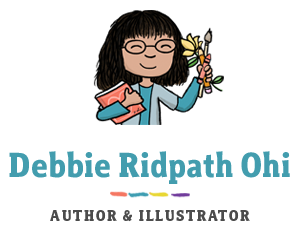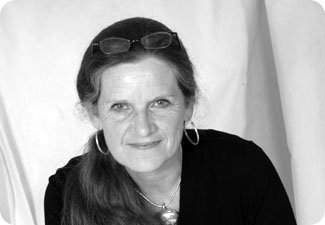
Lois Peterson is a children’s author and creative writing teacher living in B.C. Canada. Her books include 101-and more-Writing Exercises to Get You Started & Keep You Going(Metta), Meeting Miss 405 (Orca Book Publishers) The Ballad of Knuckles McGraw (Orca), and Silver Rain scheduled for publication in October.
I first met Lois at the Surrey Writer’s Conference in B.C. years ago and then at the SCBWI Conference in L.A. last year — it was great to catch up!
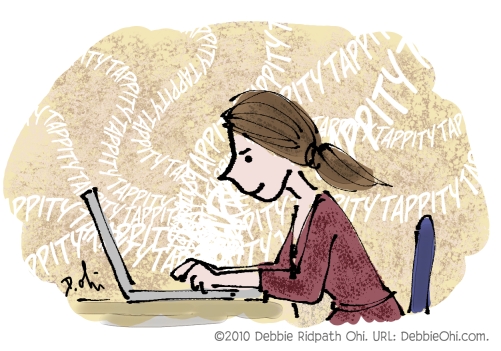
You can find out more about Lois at:
How long have you been writing?
Started writing agonizingly self-conscious poetry in my early teens.
Then tried again when my daughter was about two. My first published piece was an article in the local newspaper about a dinner to celebrate International Women’s Day. I then went on to write articles and personal narrative before trying my hand at literary short stories which I published in the US, UK and Canada for about ten years.
First attempted writing for children in 2007. Started with Elsie and the Silver Rain (will be published as SILVER RAIN in fall 2010), and in between published MEETING MISS 405 (2008) and THE BALLAD OF KNUCKLES McGRAW which came out in April. The first review just showed up on CM – Highly Recommended – and Booklist.
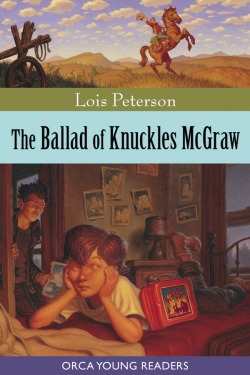
MEETING MISS 405 recently won the fiction/chapter book category of the BC Chocolate Lily Award, and in May I got to visit TO for the Forest of Reading Awards when it was nominated for the Silver Birch Express.
Did you keep any of that poetry?
I think I’ve moved 18 times since I was a teenager, lived in three countries. So stuff got left behind at every move – including my adolescent musings… for which I’m very grateful
You said your first published piece was an article in the local newspaper. Did you query first or send the whole article?
I had an ‘in’ with the local paper in that my job at the time was doing the PR for the library, I had submitted lots of news releases, had met the editor on a number of occasions including when he had interviewed me when I ran for election to the school board. So I was able to pick up the phone, get right through, and get an okay to do the piece on the spot.
How did you sell your first book?
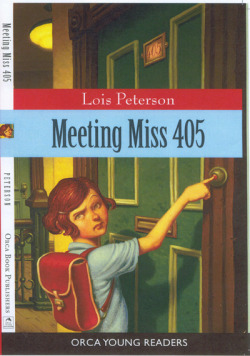
In June 2007 I mailed a query + three chapters of my first book to 5 publishers. One never answered. One US publisher sent me a gorgeous letter saying how much they loved the writing, the concept, the characters…. but it was not for them. One, Raincoast, was just switching from publishing to distributing, one sent a form letter rejection, then Orca invited me to send the full ms. Heard back very quickly that it was being proposed to the editorial committee, and it was accepted in November, published the following fall.
You’re experienced in a wide variety of writing genres. What type of writing do you enjoy the most?
Probably what everyone says, ‘Whatever I’m writing at the moment’. But I am having a ball writing for kids and teens, and still juggling travel writing/ideas.
What’s your typical writing day?
No typical writing day. I’m working two jobs these days – which often means stretches of 10-13 days straight. But I try to come up with 1,000-3,000 new words a week (sometimes in the dead of night), however shitty, and also grab snatches of time to ‘work’ other ideas in my notebook – exploring leads, themes, motifs for WIPS. Sometimes write scenes on the run if time and ideas coincide.
Wow, sounds like you’re super-busy. How do manage your time?
No TV! I’ve not had one for about ten years, and I think it’s extended my life by at least two. Although I am a TED.com fan, so can get diverted with that too easily.
Also, I try to plan my writing time first, then fit in everything else I can around it. And it helps having few friends, and family living far away (I’m only half joking!)
Could you tell me more about your most recent project, THE BALLAD OF KNUCKLES McGRAW? What inspired you to write it? What was your writing process? (e.g. outline first etc.)
I got the idea of KNUCKLES one day as I sat at a railroad crossing following box cars go by. Saw some grafitti on one, imagined who might also be watching the train and why, and went on from there.
I don’t ‘outline’ until after. Once I get the germ, I trust the story is there somewhere and write either until I get stuck of get finished. Then I go back and analyze the story’s structure (sometimes using the 12 steps of the Hero’s Journey, or rearrange it to fit the three-act format) and go on from there.
When I have a good first draft I run it past my husband Douglas who is an editor in real life (ex newspaper), and has excellent, and very objective, insights.
Sometimes, such as the case of two WIPs ‘Escape From the Marshes’ (an adventure story set among the Marsh Arabs (Ma’dan) of Iraq in about 1940 and ‘The Pilgrim’s Boy’ (a ‘ghost story’ set in Winchester, England) I get the germ, then immerse myself in all kinds of research from all kinds of sources. Once I’ve filled a notebook with ideas, motifs, ideas, metaphor, quotes, detail, etc., I set it aside, then start writing, and go back and check the first draft against the research material before I launch on the next draft.
How long does it typically take you to write a book?
There’s no typically. MM405 was submitted within two weeks of starting it. I actually wrote the three drafts in five days. Elsie and the Silver Rain (tpb as Silver Rain fall 2010) was begun months before that book, and was submitted about two years later, with two other (shorter) books finished in between. I think if I had no ‘real life’ jobs to go to, I might say it would take about three months of solid writing to write a kids’ book on average. But the more other work I have on my hands, the less time I can spend writing at a stretch.
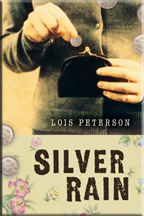
What’s your writing process for a children’s book? e.g. do you outline? If so, how much? Do you aim for daily wordcount goals?
I don’t outline, but trust the story to emerge once I start writing.
I did learn from years of writing short stories not to start writing until I have a first para or even line in my head. If I start with the wrong voice, I often have a really hard time getting the story to flow.
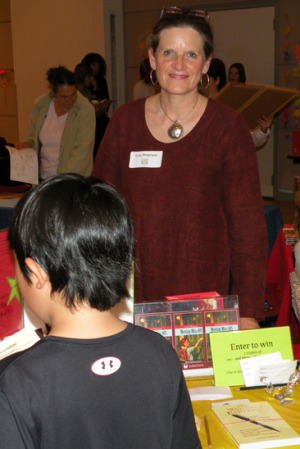
Once I have a good early draft, then I go back and mentally break it down or perhaps plug scenes into the Hero’s Journey to get a sense of how the structure is working, and make changes from there.
Ideally I’d like to write between 1,000-3,000 words a day. I do write fast, but my work schedule these days often precludes me from writing every day. So when I get the chance, I like between three and five hours to write at a stretch, and can usually churn out a lot of words in that time.
I do suggest to students to write every day, but I can hardly hold myself up as a good example these days.
What do you mean by “Hero’s Journey”?
The Hero’s Journey is the story structure identified and developed by the mythologist Joseph Campbell, which explains and describes the intuitive need for story in human experience. A writing mentor of mine used to say that ‘plot’ is not a verb, meaning that it’s not something to impose on a story, but rather something that comes out of human action and reaction to circumstance.
Christopher Vogler in his book ‘The Writer’s Journey’ shows how the Hero’s Journey can be used to help develop story in a way that reflects what humans need. And I’ve found the framework of the twelve steps of the journey is a useful tool for figuring out what might be missing when a story does not come together in a way that is psychologically satisfying… to the writer and/or the reader.
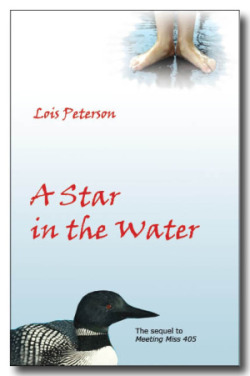
Where do you write? (describe your work area) Do you have any writing rituals?
I write best at my desk in my study. It’s a small room, with only one narrow window, and filled up with my desk, and a futon that’s always overloaded with stuff I haven’t got around to putting away.
I have written several thousand words on a netbook on my lap in bed when I’m on the road, but somehow I’m more productive with a full sized keyboard, sitting in a proper chair.
I make a mess while I work – paper everywhere, pens all over the place (even if I’ve been keyboarding the whole time!), but once I’m done I clean it up and/or I always have to have a clean desk to start out with.
Ritual – I don’t like overhead light, so I always work with one or two task lights rather than an overhead one.
I used to go through a lot of candy while I worked, but I’m trying to cut down, so don’t keep any nibblies at my elbow while I’m writing.
What are your current/upcoming projects?
Glad you asked. Recently heard that Orca will publish my YA Hi-Lo STALKER in the spring 2011, so expect to start revisions on that soon and I’m waiting to hear on early chapter book THE WRONG BUS. When I’m in England in the fall I’ll be working on THE PILGRIM’S BOY or THE SPARROW THIEF (both set in the UK) and possibly researching one about smuggling on the Isle of Wight.
Between now and then am working on a grant proposal for WRITTEN ON THE HEART about the Dukhobor experience in BC in the 50s.
A bit like a glutton at a feast, my eyes are always bigger than my belly… I have a short attention span, which explains why I juggle more than one project at at time.
Should I also mention ESCAPE FROM THE MARSHES & RETURN OF THE SUMMER FISH, both set in Iraq where I grew up..?
If you could go back in time and give one piece of advice to your younger “hopeful writer” self, what would it be?
When I started writing, I probably spent too much time thinking about it, reading how-to-books, going to hear other writers read their work. When probably I needed someone who would say to me what my father did when I was a kid and about to launch on yet another piece of verbal fiction (lie!) – “Don’t just tell me – write about it.” Perhaps the best advice I know, and give others now, is “The more you write, the easier it gets; the more you write the better it gets. So just WTDT (Write the Damn Thing!)”
For more insights from book creators, see my Inkygirl Interview Archives and Advice For Young Writers And Illustrators From Book Creators.

